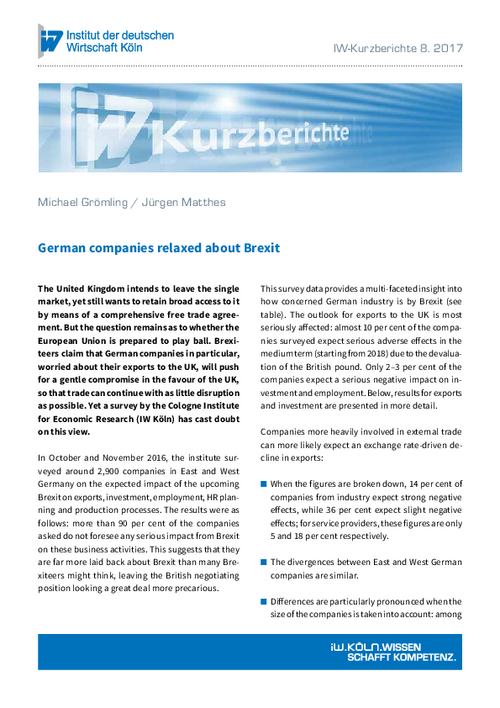The United Kingdom intends to leave the single market, yet still wants to retain broad access to it by means of a comprehensive free trade agreement. But the question remains as to whether the European Union is prepared to play ball. Brexiteers claim that German companies in particular, worried about their exports to the UK, will push for a gentle compromise in the favour of the UK, so that trade can continue with as little disruption as possible. Yet a survey by the Cologne Institute for Economic Research (IW Köln) has cast doubt on this view.

German companies relaxed about Brexit
IW-Kurzbericht

The United Kingdom intends to leave the single market, yet still wants to retain broad access to it by means of a comprehensive free trade agreement. But the question remains as to whether the European Union is prepared to play ball. Brexiteers claim that German companies in particular, worried about their exports to the UK, will push for a gentle compromise in the favour of the UK, so that trade can continue with as little disruption as possible. Yet a survey by the Cologne Institute for Economic Research (IW Köln) has cast doubt on this view.
In October and November 2016, the institute surveyed around 2,900 companies in East and West Germany on the expected impact of the upcoming Brexit on exports, investment, employment, HR planning and production processes. The results were as follows: more than 90 per cent of the companies asked do not foresee any serious impact from Brexit on these business activities. This suggests that they are far more laid back about Brexit than many Brexiteers might think, leaving the British negotiating position looking a great deal more precarious.
This survey data provides a multi-faceted insight into how concerned German industry is by Brexit (see table). The outlook for exports to the UK is most seriously affected: almost 10 per cent of the companies surveyed expect serious adverse effects in the medium term (starting from 2018) due to the devaluation of the British pound. Only 2–3 per cent of the companies expect a serious negative impact on investment and employment. Below, results for exports and investment are presented in more detail.
Companies more heavily involved in external trade can more likely expect an exchange rate-driven decline in exports:
- When the figures are broken down, 14 per cent of companies from industry expect strong negative effects, while 36 per cent expect slight negative effects; for service providers, these figures are only 5 and 18 per cent respectively.
- The divergences between East and West German companies are similar.
- Differences are particularly pronounced when the size of the companies is taken into account: among larger companies with more than 500 employees, around 20 per cent expect a strong decline in exports due to exchange rate changes and around 40 per cent a slight decline. By contrast, among SMEs, only about 8 per cent believe they will be seriously affected and 26 per cent, slightly affected.
Despite export-related concerns, however, only 2 per cent of large companies surveyed assume Brexit will have strong negative effects on their investments. In cases where such stronger effects are expected, differences across company categories are remarkably small. By contrast, where a slight negative effect on company investments is expected, the above-mentioned differentiation becomes clear: relatively speaking, there is more concern among industrial (19 per cent), West German (16 per cent) and large companies (21 per cent).
However, Brexit may also have a positive impact on the German economy. Almost a quarter of companies expect that their own business activities may benefit due to diversionary effects, at the British economy’s expense. In fact, that is a somewhat higher share than for the category decline in investment. For example, EU-based purchasers of British goods may no longer buy British goods as a result of EU import barriers post-Brexit, but may demand German companies’ products instead. Industrial firms (27 per cent) are more likely to foresee such diversionary effects than service providers (21 per cent). Differences between other company categories are relatively minor.

Michael Grömling / Jürgen Matthes: German companies relaxed about Brexit
IW-Kurzbericht

More on the topic

Effects of Public Investment on Companies in Germany – Results of the IW Business Survey
Weak public investment activity in Germany has contributed to the low productivity growth of the last decades. Even maintaining the contribution to growth of state-owned capital stock at the already low level of the 1990s would have required an additional ...
IW
Reform of EU-fiscal rules: Lindner's ideas have merit
The German government's proposal to introduce a fixed limit on government spending growth for highly indebted member states in the course of the reform of the Stability and Growth Pact makes sense. Given the macroeconomic environment, such a minimum ...
IW